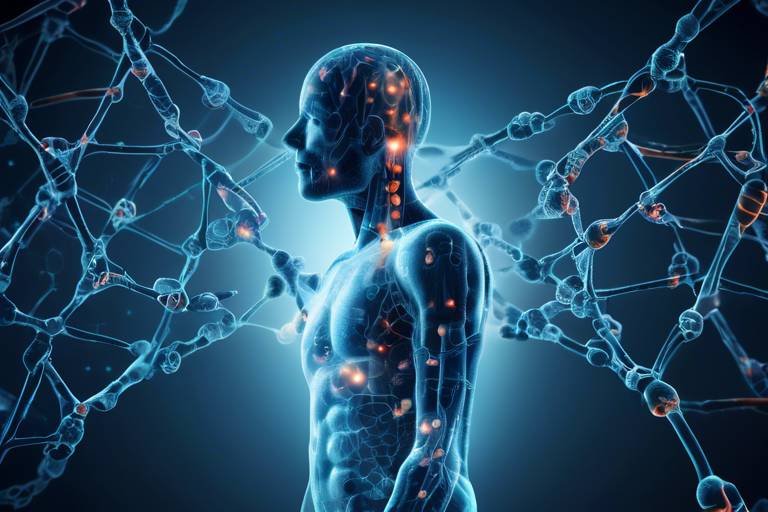AI and Genetics: Discovering Health Solutions
In today's rapidly evolving world, the fusion of artificial intelligence (AI) and genetics is not just a trend; it's a revolution. Imagine having the power to predict health issues before they manifest, or tailoring treatments specifically to an individual's genetic makeup. This is the exciting frontier where AI meets genetics, a collaboration that holds the promise of transforming healthcare as we know it. By leveraging vast amounts of genomic data, AI is reshaping our understanding of diseases, enhancing predictive analytics, and paving the way for personalized medicine. But how exactly does this work? Let's dive deeper into this fascinating intersection of technology and biology.
Artificial intelligence significantly accelerates genetic research by analyzing vast datasets, identifying patterns, and uncovering insights that would be impossible for humans to detect. Think of it as having a super-intelligent assistant that can sift through mountains of data in seconds, pinpointing crucial genetic markers that could lead to groundbreaking discoveries. This capability is revolutionizing our understanding of genetics, allowing researchers to make connections that were once thought impossible. For instance, AI can analyze genetic variations across different populations, helping to identify why certain groups are more susceptible to specific diseases.
Various AI-driven techniques are employed to analyze genomic data, including machine learning algorithms and neural networks. These sophisticated tools facilitate the discovery of genetic markers associated with diseases and potential therapeutic targets. Imagine having a crystal ball that not only shows you the present but also predicts future health outcomes based on genetic predispositions. This is the power of AI in genomic data analysis, where algorithms learn from historical data to improve their accuracy over time.
Machine learning algorithms can predict genetic predispositions to diseases by learning from historical data and improving their accuracy over time. This means that with each new dataset, the algorithms become better at identifying potential health risks. For example, if your family has a history of heart disease, AI can analyze your genetic data alongside that history to provide insights into your own risk factors. This ultimately aids in early diagnosis and prevention strategies, giving individuals a fighting chance against diseases before they take hold.
Deep learning approaches, a subset of machine learning, utilize complex neural networks to analyze genomic sequences. This technology provides insights into gene expression and regulation that inform treatment decisions. Picture a vast network of interconnected nodes, each representing different genetic sequences. As data flows through this network, it reveals patterns and relationships that can guide doctors in choosing the most effective treatments tailored to an individual's unique genetic profile.
Natural Language Processing (NLP) techniques help extract valuable information from scientific literature and clinical notes. By converting unstructured text into structured data, NLP enables researchers to stay updated on the latest genomic discoveries and trends. Imagine having an assistant that reads thousands of research papers in seconds and summarizes the key findings relevant to your work. This capability not only saves time but also enhances the overall efficiency of genetic research.
As AI technologies advance in genetics, ethical considerations surrounding data privacy, consent, and potential discrimination arise. With great power comes great responsibility, and the use of genetic information must be approached with caution. Guidelines are necessary to ensure that individuals' genetic data is used responsibly and ethically, preventing misuse that could lead to discrimination in healthcare or employment. Thus, while the potential benefits of AI in genetics are immense, it is crucial to navigate these ethical waters carefully.
AI enhances personalized medicine by tailoring treatments based on an individual's genetic makeup. This leads to more effective therapies and improved patient outcomes in various health conditions. Imagine a world where your doctor prescribes a treatment plan specifically designed for your unique genetic profile, significantly increasing the chances of success. This is no longer a distant dream; it's becoming a reality thanks to advancements in AI.
Pharmacogenomics studies how genes affect a person's response to drugs. AI can optimize medication selection and dosages, minimizing adverse effects and maximizing therapeutic benefits for patients. For instance, if you have a genetic variant that affects how your body metabolizes a particular medication, AI can help identify alternative treatments that would be more effective for you. This personalized approach not only enhances treatment efficacy but also reduces the trial-and-error process often associated with medication.
Predictive analytics powered by AI can forecast disease outbreaks and patient outcomes based on genetic data. This allows healthcare providers to implement proactive measures and improve overall public health strategies. Imagine being able to predict the next flu outbreak in your community before it happens, enabling healthcare systems to prepare and respond effectively. This level of foresight could save countless lives and resources, showcasing the transformative power of AI in healthcare.
- What is the role of AI in genetics? AI helps analyze vast amounts of genomic data to identify patterns and insights that can lead to improved healthcare solutions.
- How does machine learning contribute to genetic research? Machine learning algorithms can predict genetic predispositions to diseases, aiding in early diagnosis and prevention strategies.
- What are the ethical concerns associated with AI in genetics? Ethical considerations include data privacy, consent, and potential discrimination, necessitating careful guidelines for responsible use.
- What is pharmacogenomics? Pharmacogenomics studies how genes affect a person's response to drugs, allowing for optimized medication selection tailored to individual genetic profiles.

The Role of AI in Genetic Research
Artificial intelligence (AI) is not just a buzzword; it’s a revolutionary force that is reshaping the landscape of genetic research. Imagine having a super-intelligent assistant that can sift through mountains of genetic data at lightning speed, identifying patterns and correlations that would take humans years, if not decades, to uncover. This is precisely what AI brings to the table. By leveraging algorithms and machine learning, researchers can analyze vast datasets that include genomic sequences, clinical data, and even environmental factors, leading to breakthroughs in our understanding of genetics.
One of the most exciting aspects of AI in genetic research is its ability to accelerate the discovery of genetic markers associated with various diseases. For instance, AI can analyze data from thousands of patients to pinpoint specific genetic variations that may predispose individuals to conditions like cancer, diabetes, or heart disease. This not only enhances our understanding of these diseases but also opens doors for developing targeted therapies that can significantly improve patient outcomes.
Moreover, AI can help in uncovering complex interactions between genes and environmental factors. Traditional research methods often struggle to account for the multifactorial nature of diseases. However, with AI's capability to handle complex datasets, researchers can explore how lifestyle choices, environmental exposures, and genetic predispositions converge to influence health outcomes. This holistic approach is crucial for developing comprehensive prevention strategies and personalized treatment plans.
To illustrate the impact of AI in genetic research, consider the following table that outlines some key AI applications:
| AI Application | Description |
|---|---|
| Pattern Recognition | Identifying genetic variations linked to diseases through data analysis. |
| Predictive Modeling | Forecasting disease risk based on genetic and environmental data. |
| Data Integration | Combining various data sources to provide a comprehensive view of genetic influences. |
| Gene Editing | Optimizing CRISPR and other gene-editing technologies for therapeutic applications. |
As we delve deeper into the realm of AI and genetics, it’s essential to recognize that this collaboration is not just about speed and efficiency. It's about transforming the way we approach healthcare. The insights gained from AI-driven genetic research are paving the way for innovative treatments and preventive measures that were once thought to be the stuff of science fiction. However, with great power comes great responsibility. The ethical implications of using AI in genetics, including issues of data privacy and consent, must be carefully navigated to ensure that these technologies benefit all of humanity.
In summary, the role of AI in genetic research is nothing short of groundbreaking. By harnessing the power of machine learning and data analysis, we are on the brink of a new era in healthcare that promises to not only enhance our understanding of genetics but also improve health outcomes for individuals worldwide.
- How does AI improve genetic research? AI analyzes large datasets quickly, identifying patterns and correlations that human researchers might miss, leading to faster discoveries.
- What are genetic markers? Genetic markers are specific sequences in the genome that can be associated with a particular disease or trait.
- What ethical concerns exist with AI in genetics? Issues include data privacy, consent, and potential discrimination based on genetic information.

Genomic Data Analysis Techniques
When it comes to decoding the mysteries of our genetic makeup, AI-driven genomic data analysis techniques are at the forefront of innovation. These techniques are not just about crunching numbers; they are about revealing the hidden stories within our DNA. By utilizing advanced algorithms, researchers can sift through mountains of genomic data, identifying patterns that would be nearly impossible for humans to detect. Imagine trying to find a needle in a haystack, but instead of a needle, you're searching for genetic markers that could hold the key to understanding diseases. This is where AI shines!
Among the various techniques employed, machine learning algorithms stand out as a powerful tool. These algorithms are designed to learn from historical data, continuously improving their predictive capabilities. For instance, when fed with genetic information from diverse populations, machine learning can discern subtle variations that might indicate a predisposition to certain health conditions. This capability is not just a technological marvel; it has real-world implications for early diagnosis and prevention strategies.
Another fascinating approach in genomic data analysis is the use of neural networks. These complex systems mimic the human brain's interconnected neurons, allowing for the analysis of intricate genomic sequences. Through deep learning techniques, researchers can gain insights into gene expression and regulation, which can significantly inform treatment decisions. Think of it as having a highly sophisticated translator that can interpret the language of your genes, providing clarity on how they function and interact.
Additionally, Natural Language Processing (NLP) plays a crucial role in this domain. By analyzing vast amounts of scientific literature and clinical notes, NLP enables researchers to extract valuable insights that keep them abreast of the latest discoveries in genetics. Imagine being able to read and comprehend thousands of research papers in mere seconds—this is the power of NLP in action! It ensures that researchers are not only aware of current trends but can also leverage past findings to drive future innovations.
To illustrate the various techniques employed in genomic data analysis, consider the following table:
| Technique | Description | Applications |
|---|---|---|
| Machine Learning | Algorithms that learn from historical data to predict outcomes. | Disease prediction, early diagnosis. |
| Deep Learning | Advanced neural networks that analyze complex genomic sequences. | Gene expression analysis, treatment decision-making. |
| Natural Language Processing | Techniques to extract information from text data. | Literature review, trend analysis. |
In summary, the intersection of AI and genomic data analysis is like opening a treasure chest filled with possibilities. Each technique, from machine learning to NLP, contributes to a richer understanding of genetics, paving the way for groundbreaking discoveries in healthcare. As we continue to harness the power of these technologies, the potential for improved disease prediction and personalized treatment plans becomes more tangible, promising a healthier future for all.
- What is genomic data analysis? Genomic data analysis involves examining and interpreting the genetic information contained within DNA to understand its implications for health and disease.
- How does AI improve genomic data analysis? AI enhances genomic data analysis by processing large datasets quickly and accurately, identifying patterns that may not be visible to human researchers.
- What are the ethical concerns associated with AI in genetics? Ethical concerns include data privacy, informed consent, and the potential for discrimination based on genetic information.
- Can AI predict diseases based on genetic data? Yes, AI can analyze genetic data to predict an individual's predisposition to various diseases, aiding in early diagnosis and prevention.

Machine Learning in Genomics
Machine learning is not just a buzzword; it's a game changer in the field of genomics. Imagine having a powerful assistant that can sift through mountains of genetic data faster than any human could dream. That's what machine learning brings to the table! By analyzing historical data, these algorithms learn to identify patterns that can predict genetic predispositions to various diseases. This isn’t just about crunching numbers; it's about uncovering insights that can lead to early diagnosis and tailored prevention strategies. Think of it as having a crystal ball that helps us see potential health risks before they even manifest.
One of the most fascinating aspects of machine learning in genomics is its ability to continuously improve. As more data becomes available, these algorithms refine their predictions, enhancing their accuracy over time. It's like training a dog; the more you practice, the better it gets at fetching the ball! In the realm of healthcare, this means that doctors can have access to increasingly precise information regarding a patient’s genetic makeup, enabling them to make informed decisions regarding treatment plans.
To give you a clearer picture, let’s break down how machine learning operates in genomics:
- Data Collection: It all starts with gathering vast amounts of genomic data from various sources, including clinical trials, research studies, and patient records.
- Feature Selection: Machine learning algorithms identify which genetic markers are most relevant to specific diseases, filtering out the noise.
- Model Training: The algorithms are trained using historical data to learn from past outcomes and improve their predictive capabilities.
- Prediction: Once trained, these models can predict an individual's likelihood of developing certain conditions based on their genetic information.
This intricate process allows healthcare providers to not only assess risks but also implement preventive measures tailored to individual patients. For instance, if a machine learning model indicates that someone has a high genetic risk for diabetes, doctors can work with the patient to create a personalized prevention plan that includes lifestyle changes and regular monitoring.
Moreover, the implications of machine learning in genomics extend beyond individual treatment plans. On a larger scale, researchers can analyze population-level data to identify trends and correlations that inform public health strategies. This could mean the difference between controlling a disease outbreak and watching it spiral out of control. The potential here is enormous, and as technology continues to evolve, so too will our understanding of how genetics influence health.
In summary, machine learning serves as a bridge between complex genetic data and actionable healthcare insights. By harnessing the power of algorithms, we are stepping into a future where personalized medicine is not just a dream but a tangible reality. The journey is just beginning, and the possibilities are as vast as the human genome itself!
- What is machine learning in genomics?
Machine learning in genomics refers to the use of algorithms that analyze genetic data to identify patterns and make predictions about health risks and disease predisposition. - How does machine learning improve healthcare?
By providing insights into an individual's genetic makeup, machine learning aids in early diagnosis, personalized treatment plans, and preventive healthcare strategies. - Can machine learning predict diseases?
Yes, machine learning algorithms can predict the likelihood of developing certain diseases based on genetic information and historical data. - What are the ethical concerns with using AI in genetics?
Concerns include data privacy, informed consent, and potential discrimination based on genetic information.

Deep Learning Approaches
Deep learning approaches represent a groundbreaking evolution in the field of genomics, employing sophisticated neural networks to unravel the complexities of genetic sequences. Imagine trying to find a needle in a haystack—now, imagine that haystack is a vast sea of genomic data. Traditional methods might take ages, but deep learning acts like a super-powered magnet, efficiently pinpointing the critical genetic markers that could lead to revolutionary treatments. By mimicking the way our brains process information, these algorithms can learn from vast amounts of data, improving their accuracy and effectiveness over time.
One of the most exciting aspects of deep learning in genetics is its ability to analyze gene expression patterns. This means that instead of just looking at the sequence of DNA, researchers can understand how genes behave under different conditions. For instance, deep learning models can help identify which genes are turned on or off in specific diseases, providing insights into the underlying mechanisms of various health conditions. This not only enhances our understanding of diseases but also aids in the development of targeted therapies that can lead to better patient outcomes.
Moreover, deep learning approaches can also facilitate the identification of potential therapeutic targets. By analyzing large datasets, these models can predict how different genetic variations might influence an individual's response to treatments. This predictive power is invaluable in personalized medicine, where the goal is to tailor therapies based on an individual's unique genetic profile. For example, if a deep learning model identifies that a specific genetic mutation is linked to a patient's poor response to a particular drug, healthcare providers can adjust the treatment plan accordingly, optimizing the chances of success.
However, the implementation of deep learning in genetics isn't without its challenges. The complexity of the algorithms and the sheer volume of data require significant computational resources. Additionally, there is a pressing need for transparency in how these models make predictions. After all, when it comes to health, patients and providers alike want to understand the 'why' behind a recommendation. To address these concerns, researchers are actively working on developing explainable AI (XAI) methods that can clarify the decision-making processes of deep learning models.
In summary, deep learning approaches are revolutionizing the way we analyze genomic data. By leveraging the power of neural networks, researchers can uncover insights that were previously hidden, paving the way for innovative treatments and personalized healthcare solutions. As we continue to explore this exciting frontier, the potential for deep learning in genetics seems boundless, promising a future where healthcare is not only more effective but also more tailored to the individual.
- What is deep learning in genetics? Deep learning in genetics refers to the use of advanced neural networks to analyze and interpret genomic data, uncovering patterns that can lead to new insights and treatment options.
- How does deep learning improve personalized medicine? By analyzing an individual's genetic makeup, deep learning models can predict how they will respond to specific treatments, allowing for more tailored and effective healthcare solutions.
- What challenges does deep learning face in genetics? Some challenges include the need for significant computational resources, data privacy concerns, and the necessity for transparency in the decision-making processes of AI models.

Natural Language Processing in Genetics
Natural Language Processing (NLP) is a fascinating field that merges linguistics and artificial intelligence, and its impact on genetics is nothing short of revolutionary. Imagine trying to sift through thousands of research papers, clinical notes, and genomic databases—it's like searching for a needle in a haystack! NLP steps in as the superhero of this scenario, enabling researchers to extract meaningful information from vast amounts of unstructured data quickly and efficiently. By employing sophisticated algorithms, NLP can identify key findings, trends, and even emerging theories in genetics, allowing scientists to stay current in a rapidly evolving field.
One of the most significant advantages of NLP in genetics is its ability to analyze scientific literature. With the exponential growth of published research, keeping up with the latest discoveries can be overwhelming. NLP tools can scan through these documents and summarize findings, highlight critical genetic markers, and even suggest potential research directions. This not only saves time but also enables researchers to focus on what truly matters—advancing our understanding of genetics and its applications in healthcare.
Moreover, NLP can enhance the processing of clinical notes, which often contain valuable insights about patient histories, treatment responses, and genetic predispositions. By converting these notes into structured data, healthcare professionals can better understand patient needs and tailor treatments accordingly. For instance, if a patient's notes indicate a family history of a specific genetic disorder, NLP can flag this information, prompting doctors to consider genetic testing or preventive measures.
In addition to improving research and clinical practices, NLP can also facilitate collaboration across disciplines. By translating complex genetic terminology into more accessible language, it fosters communication between geneticists, clinicians, and even patients. This democratization of information ensures that everyone involved in a patient's care is on the same page, ultimately leading to better health outcomes.
As we look to the future, the potential of NLP in genetics is boundless. Imagine a world where researchers can instantly access the latest findings, healthcare providers can quickly interpret genetic data, and patients can understand their genetic risks with ease. The integration of NLP into genetics not only enhances our ability to analyze and interpret data but also paves the way for more personalized and effective healthcare solutions.
- What is Natural Language Processing (NLP)?
NLP is a branch of artificial intelligence that focuses on the interaction between computers and humans through natural language. It enables machines to understand, interpret, and respond to human language in a valuable way.
- How does NLP benefit genetic research?
NLP helps researchers analyze vast amounts of textual data, extracting critical insights from scientific literature and clinical notes, which accelerates the pace of genetic discoveries.
- Can NLP improve patient care?
Yes! By converting clinical notes into structured data, NLP aids healthcare providers in understanding patient histories and tailoring treatments based on genetic information.
- What are the future prospects of NLP in genetics?
The future looks bright! As NLP technology continues to evolve, its applications in genetics will likely expand, leading to more personalized healthcare solutions and enhanced collaboration among professionals.

Ethical Considerations in AI and Genetics
The integration of artificial intelligence in the field of genetics brings forth a plethora of opportunities, but it also raises significant ethical questions that cannot be ignored. As we delve deeper into this intersection, we must consider how genetic data is collected, analyzed, and utilized. One of the primary concerns is data privacy. With AI systems processing vast amounts of sensitive genetic information, the potential for data breaches or misuse becomes a pressing issue. Imagine your genetic makeup being analyzed and shared without your consent—it's a chilling thought, isn't it?
Moreover, the issue of informed consent cannot be overlooked. Individuals must be fully aware of how their genetic data will be used and the implications of its use. This is particularly crucial in research settings where participants might not fully grasp the extent of data sharing or the potential outcomes of AI-driven analyses. Researchers and healthcare providers have a responsibility to ensure that participants are not only informed but also comfortable with the decisions they make regarding their genetic information.
Another critical aspect is the risk of discrimination. As AI systems become more adept at predicting health risks based on genetic data, there is a possibility that this information could be used against individuals, particularly in areas like insurance and employment. Imagine a scenario where someone is denied health insurance simply because an AI model predicted a higher likelihood of developing a certain condition based on their genetic profile. This raises the question: how do we protect individuals from potential biases that could stem from AI interpretations?
To navigate these ethical waters, it is essential to establish robust guidelines and regulations that govern the use of AI in genetics. These guidelines should encompass various aspects, including:
- Data Security: Implementing stringent measures to protect genetic data from unauthorized access.
- Transparency: Ensuring that AI algorithms used in genetic research are transparent and explainable.
- Equity: Addressing potential biases in AI models to prevent discrimination based on genetic information.
In conclusion, while the fusion of AI and genetics holds tremendous promise for advancing healthcare, it is imperative that we tread carefully. By addressing these ethical considerations head-on, we can harness the power of AI responsibly, ensuring that it serves humanity rather than undermining individual rights and freedoms.
- What are the main ethical concerns regarding AI in genetics?
The primary concerns include data privacy, informed consent, and the risk of discrimination based on genetic information. - How can we ensure data privacy in genetic research?
Implementing stringent security measures and regulations can help protect sensitive genetic data from unauthorized access. - What role does informed consent play in genetic research?
Informed consent ensures that individuals understand how their genetic data will be used and the implications of its use. - Can AI lead to discrimination in healthcare?
Yes, if not carefully managed, AI predictions based on genetic data could lead to bias in insurance and employment decisions.

Personalized Medicine and AI
In the ever-evolving landscape of healthcare, personalized medicine has emerged as a groundbreaking approach that tailors medical treatment to the individual characteristics of each patient. By leveraging the power of artificial intelligence (AI), healthcare providers can now create customized treatment plans based on a patient's unique genetic makeup, lifestyle, and environmental factors. This shift from a one-size-fits-all model to a more individualized approach is not just a trend; it's a revolution in how we understand and treat diseases.
Imagine a world where your medication is specifically designed for your body, where the side effects are minimized, and the effectiveness is maximized. This is not science fiction; this is the promise of personalized medicine powered by AI. By analyzing vast amounts of genetic data, AI can identify specific genetic variations that influence how patients respond to different treatments. This allows for more precise medication selection and dosage adjustments, ensuring that patients receive the best possible care tailored to their needs.
One of the most exciting areas of personalized medicine is pharmacogenomics, which studies how genes affect an individual's response to drugs. With AI's ability to process and analyze complex genomic data, healthcare professionals can optimize medication regimens for patients. For instance, if a patient has a genetic marker that indicates they will metabolize a certain medication poorly, AI can suggest an alternative treatment that will be more effective. This not only improves patient outcomes but also reduces the risk of adverse drug reactions, which can be a significant concern in traditional medicine.
Moreover, AI-driven predictive analytics plays a crucial role in anticipating health outcomes. By examining genetic data alongside other health metrics, AI can forecast potential disease risks and outcomes. This proactive approach enables healthcare providers to implement preventive measures before a condition escalates, ultimately improving the overall health of populations. For example, if AI predicts a higher likelihood of diabetes in a patient based on their genetic profile, doctors can recommend lifestyle changes or early interventions to mitigate that risk.
However, with great power comes great responsibility. As we embrace the benefits of AI in personalized medicine, we must also navigate the ethical considerations that arise. Issues such as data privacy, informed consent, and potential discrimination based on genetic information must be addressed to ensure that these advanced technologies are used responsibly. Establishing clear guidelines and regulations is essential to protect patients while harnessing the full potential of AI in healthcare.
In summary, the integration of AI into personalized medicine is paving the way for a future where treatments are not just more effective but also more humane. By focusing on the individual rather than the average, we can transform healthcare into a truly patient-centered experience. The journey of personalized medicine is just beginning, and with AI at the helm, the possibilities are limitless.
- What is personalized medicine?
Personalized medicine is a medical model that tailors treatment to the individual characteristics of each patient, including their genetic makeup. - How does AI contribute to personalized medicine?
AI analyzes vast amounts of genetic and health data to create customized treatment plans, optimizing medication selection and predicting patient outcomes. - What is pharmacogenomics?
Pharmacogenomics is the study of how genes affect a person's response to drugs, helping to personalize medication regimens. - Are there ethical concerns with using AI in healthcare?
Yes, ethical considerations include data privacy, informed consent, and potential discrimination based on genetic information.

Pharmacogenomics
Pharmacogenomics is a fascinating field that delves into how our genetic makeup influences our responses to medications. Imagine a world where your doctor could tailor your prescriptions based on your DNA, ensuring that you receive the most effective treatments with minimal side effects. Sounds incredible, right? This is not just a futuristic dream; it’s becoming a reality thanks to the integration of artificial intelligence in healthcare.
At its core, pharmacogenomics aims to personalize medicine by analyzing genetic variations that affect drug metabolism and efficacy. For instance, some individuals may metabolize a drug too quickly, rendering it ineffective, while others might process it too slowly, leading to adverse reactions. Here’s where AI comes into play. By employing advanced algorithms, researchers can sift through vast amounts of genomic data to identify these variations, paving the way for more precise medication strategies.
One of the key benefits of pharmacogenomics is its ability to optimize drug selection and dosing. By understanding how a patient’s genetic profile interacts with specific medications, healthcare providers can make informed decisions that enhance therapeutic outcomes. This not only improves patient satisfaction but also reduces the trial-and-error approach that often accompanies traditional prescribing methods.
To illustrate the impact of pharmacogenomics, let’s consider a few examples:
- Warfarin: This common anticoagulant requires careful dosing. Genetic variations in the CYP2C9 and VKORC1 genes can significantly influence how patients respond to the drug. AI can analyze a patient's genetic data to recommend the optimal dose, minimizing the risk of complications.
- Antidepressants: Certain individuals may not respond well to standard antidepressant treatments due to genetic factors. Pharmacogenomic testing can guide doctors in selecting the right medication from the start, potentially leading to quicker recovery times.
Furthermore, the integration of AI in pharmacogenomics is not just about individual treatments. It has broader implications for public health. By analyzing population-wide genetic data, researchers can identify trends and predict how different demographics will respond to various drugs. This can lead to more effective public health strategies and a better understanding of how to combat widespread health issues.
However, as with any emerging technology, there are challenges to consider. Issues such as data privacy, ethical concerns, and the need for standardized testing protocols must be addressed to ensure that pharmacogenomics is implemented responsibly. The balance between innovation and ethical considerations will be crucial in shaping the future of personalized medicine.
1. What is pharmacogenomics?
Pharmacogenomics is the study of how genes affect a person's response to drugs, aiming to personalize medication based on individual genetic profiles.
2. How does AI contribute to pharmacogenomics?
AI helps analyze vast genomic data to identify genetic variations that influence drug metabolism and efficacy, enabling more precise medication strategies.
3. Why is pharmacogenomics important?
It allows for tailored treatments that improve patient outcomes, reduce side effects, and enhance overall healthcare efficiency.
4. Are there any risks associated with pharmacogenomic testing?
Yes, risks include data privacy concerns and potential discrimination based on genetic information, highlighting the need for ethical guidelines.

Predictive Analytics in Healthcare
Predictive analytics is transforming the healthcare landscape by leveraging the power of artificial intelligence to forecast patient outcomes and disease trends. Imagine having a crystal ball that not only predicts the future but also guides healthcare providers in making informed decisions. This is what predictive analytics offers: a glimpse into potential health scenarios based on vast amounts of data, including genetic information, lifestyle choices, and environmental factors.
At its core, predictive analytics involves analyzing historical data to identify patterns that can indicate future events. In healthcare, this means using algorithms to sift through mountains of patient data to predict everything from disease outbreaks to individual patient responses to treatment. For instance, by examining genetic data alongside other health indicators, AI can help predict which patients are at higher risk for conditions like diabetes or heart disease. This proactive approach allows for earlier interventions, which can significantly improve health outcomes.
One of the most exciting applications of predictive analytics is in the realm of chronic disease management. By continuously monitoring patient data, AI systems can alert healthcare providers to changes in a patient's condition, enabling timely adjustments to treatment plans. For example, if a patient with a history of heart disease shows early signs of deterioration, predictive analytics can flag this, prompting immediate medical attention. This not only enhances patient care but can also reduce hospital readmission rates, ultimately saving costs for both patients and healthcare systems.
Moreover, predictive analytics can be a game-changer in public health. By analyzing genetic data alongside demographic information, healthcare authorities can forecast potential disease outbreaks in specific communities. This predictive capability allows for the allocation of resources where they are needed most, ensuring that preventive measures can be put in place before a health crisis escalates. The table below illustrates how predictive analytics can enhance various aspects of healthcare:
| Application | Description | Benefits |
|---|---|---|
| Chronic Disease Management | Monitoring patient data to adjust treatments proactively. | Improved outcomes, reduced readmissions. |
| Disease Outbreak Prediction | Forecasting outbreaks based on genetic and demographic data. | Effective resource allocation, timely interventions. |
| Personalized Treatment Plans | Tailoring treatments based on predictive models. | Increased efficacy, minimized side effects. |
In conclusion, predictive analytics is not just a buzzword; it is a vital tool that is reshaping how healthcare providers approach patient care. By harnessing the power of AI and genetics, we can foresee potential health issues before they arise, allowing for more effective and personalized healthcare solutions. As we continue to explore the intersection of these fields, the future of healthcare looks not only promising but also profoundly transformative.
- What is predictive analytics in healthcare?
Predictive analytics in healthcare refers to the use of statistical algorithms and machine learning techniques to analyze historical data and predict future outcomes, helping healthcare providers make informed decisions. - How does AI contribute to predictive analytics?
AI enhances predictive analytics by processing large datasets quickly, identifying patterns, and improving prediction accuracy over time, leading to better patient care and resource management. - Can predictive analytics prevent diseases?
While predictive analytics cannot prevent diseases outright, it can identify individuals at higher risk, enabling early interventions and preventive measures to be implemented.
Frequently Asked Questions
- What is the role of AI in genetic research?
AI plays a crucial role in genetic research by analyzing large datasets at lightning speed. It identifies patterns and uncovers insights that would be nearly impossible for humans to detect. This capability is revolutionizing our understanding of genetics and enhancing our ability to develop new healthcare solutions.
- How do machine learning algorithms contribute to genomics?
Machine learning algorithms are essential in genomics as they predict genetic predispositions to diseases by learning from historical data. Over time, these algorithms improve their accuracy, which aids in early diagnosis and prevention strategies, making healthcare more proactive.
- What are deep learning approaches in the context of genetics?
Deep learning approaches, a subset of machine learning, utilize complex neural networks to analyze genomic sequences. They provide valuable insights into gene expression and regulation, which can inform treatment decisions and lead to more personalized healthcare solutions.
- How does Natural Language Processing (NLP) benefit genetic research?
NLP techniques help researchers extract valuable information from scientific literature and clinical notes. This capability enables them to stay updated on the latest genomic discoveries and trends, thereby enhancing the overall research process.
- What ethical considerations arise from the use of AI in genetics?
As AI technologies advance in genetics, ethical considerations such as data privacy, consent, and potential discrimination become increasingly important. It's essential to establish careful guidelines to ensure the responsible use of genetic information and protect individuals' rights.
- How does AI enhance personalized medicine?
AI enhances personalized medicine by tailoring treatments based on an individual's genetic makeup. This leads to more effective therapies and improved patient outcomes, as healthcare providers can create customized treatment plans that align with each patient's unique genetic profile.
- What is pharmacogenomics and how does AI apply to it?
Pharmacogenomics is the study of how genes affect a person's response to drugs. AI can optimize medication selection and dosages, helping to minimize adverse effects while maximizing therapeutic benefits for patients, ultimately leading to safer and more effective treatments.
- How does predictive analytics powered by AI improve healthcare?
Predictive analytics powered by AI can forecast disease outbreaks and patient outcomes based on genetic data. This allows healthcare providers to implement proactive measures, improving overall public health strategies and ensuring better resource allocation in healthcare systems.



















